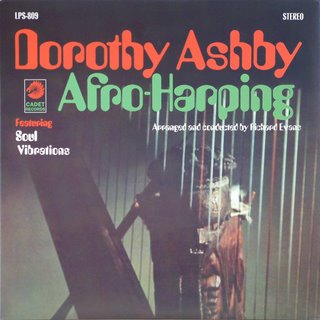
Something of a pioneer of the harp as a jazz instrument, Dorothy Ashby was born plain Dorothy Thompson in Detroit in 1932. Somehow she managed to overcome the resistance of fellow jazz musicians (might have had something to do with going to the same school as Donald Byrd and Kenny Burrell) and made herself a household name in her native city, even presenting a radio show in the 1960s. Her recorded output includes several albums for Prestige in the late 50s/early 60s, one of which, 1958's In a minor groove becoming critically acclaimed.
As the sixties went on, many bop players started to look for inspiration from othe styles, including popular music, soul and gospel. And the result of Dorothy Ashby's excursions into these genres was 1968's 'Afro-Harping' - a soulful and thoroughly contemporary take on her original, bop-influenced style. Original is a word that will always be used to describe her playing - the harp is a strange bedfellow for most modern jazz styles (perhaps suited mainly to the sort of spiritual free-jazz that was Alice Coltrane's forte).
"Soul Vibrations" is the lead track from this LP, and immediately on hearing it one can spot it's many influences. The backing has a strong soul music feel and the string introduction lends an eerie feeling that is in keeping with Ashby's following minor-key solo. Apart from a string break about half-way through, pretty much the whole track is dedicated to Ashby's soloing. She never seems to dominate - perhaps because of how low she is in the mix. It works, but I'm not sure this was the effect that Ashby herself would have wanted, having held her own with hard bop giants like Roy Haynes and Richard Davis. I just get the feeling that she ought to have sounded louder. In addition to the soul feel, the strings lend a soundtrack-like feel - to me it brings to mind that tense moment just before a chase - perhaps the hero of the tale is becoming paranoid that he is being followed. The otherworldly sound of the harp is perfect in this context, and makes the piece considerably more unusual and memorable than many of the period. And of course, there is a strong jazz feel in Ashby's solos that give it some real bop credibility (thus keeping the critics happy).


No comments:
Post a Comment